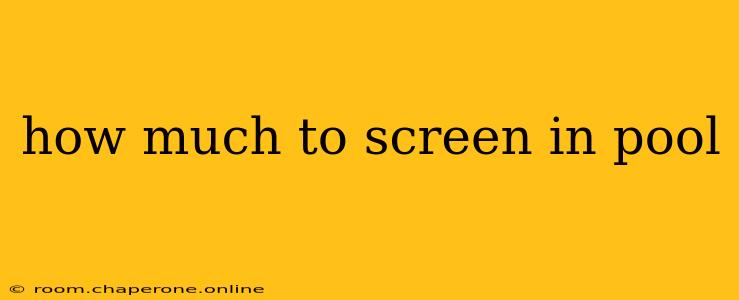Planning to transform your pool area into a luxurious, bug-free oasis? Screening in your pool is a fantastic way to extend its usability, protect it from debris, and increase your property's value. But before you dive in (pun intended!), understanding the cost is crucial. This comprehensive guide breaks down the factors influencing the price of screening in a pool, helping you budget effectively for your project.
Factors Affecting the Cost to Screen in a Pool
The cost of screening in your pool varies significantly depending on several key factors:
1. Size and Shape of the Pool Area:
This is the most significant factor. Larger pool areas naturally require more materials and labor, driving up the overall cost. Complex shapes also add to the complexity and expense of the project. Simple rectangular pools are generally cheaper to screen than irregularly shaped ones.
2. Materials Chosen:
The type of screening material you select plays a major role in the price. Options include:
- Aluminum: A popular choice due to its durability and relatively low cost.
- Vinyl: More affordable than aluminum, but generally less durable and weather-resistant.
- Wood: Offers a more aesthetically pleasing, natural look, but comes with a significantly higher price tag and requires more maintenance.
- Retractable Screens: These provide flexibility, allowing you to open and close the enclosure as needed, but they're considerably more expensive than fixed screens.
3. Features and Customization:
Adding features like doors, windows, lighting, and built-in fans will increase the total cost. Custom designs, intricate details, and high-end materials also contribute to a higher price point. Consider your needs carefully to balance cost and functionality.
4. Labor Costs:
Labor costs vary widely depending on your location and the contractor you choose. The complexity of the project (e.g., difficult terrain, unusual pool shape) will also impact labor charges. Always obtain multiple quotes from reputable contractors to compare pricing.
5. Permits and Inspections:
Depending on your local regulations, you may need to obtain building permits and undergo inspections. These fees can add to the overall project expense. Check with your local authorities to determine the necessary permits and associated costs.
Estimating the Cost: A Breakdown
While providing an exact cost is impossible without specific details of your project, we can offer a general range:
- Basic Screening (Aluminum, simple design): $5,000 - $15,000
- Mid-Range Screening (Aluminum or Vinyl, some customization): $15,000 - $30,000
- High-End Screening (Wood, extensive customization, retractable screens): $30,000+
These are rough estimates. The actual cost could be higher or lower based on the factors discussed above.
Getting Accurate Quotes: Best Practices
To get accurate quotes, follow these steps:
- Contact multiple contractors: Get at least three quotes to compare pricing and services.
- Provide detailed information: Share your pool's dimensions, desired materials, and any additional features you want.
- Clarify the scope of work: Ensure the quote includes all aspects of the project, including materials, labor, permits, and cleanup.
- Check references: Verify the contractors' reputation and experience before making a decision.
Conclusion: A worthwhile investment?
Screening in your pool offers numerous benefits, including increased usability, protection from debris and insects, and enhanced property value. While the cost can be significant, carefully planning your project and obtaining accurate quotes can help you manage your budget and enjoy the rewards of a beautifully screened pool area for years to come. Remember, the initial investment often pays off in the long run through increased enjoyment and potential property value appreciation.

